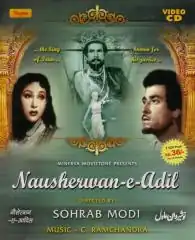Nausherwan-E-Adil
| Nausherwan-E-Adil | |
|---|---|
 | |
| Directed by | Sohrab Modi |
| Written by | Shams Lucknowi |
| Screenplay by | Shams Lucknowi |
| Story by | Shams Lucknowi |
| Produced by | Minerva Movietone |
| Starring | Sohrab Modi Raaj Kumar Mala Sinha |
| Cinematography | Lateef Bhandare |
| Edited by | P. Bhalchandra |
| Music by | C. Ramchandra |
Production company | Minerva Movietone |
| Distributed by | Minerva Movietone |
Release date |
|
Running time | 137 minutes |
| Country | India |
| Language | Hindi |
Nausherwan-E-Adil (transl. Nausherwan, the just) also called Farz Aur Mohabbat, is a 1957 Indian costume action drama Hindi/Urdu film directed by Sohrab Modi.
Produced by Minerva Movietone, it had music composed by C. Ramchandra with lyrics by Parwaiz Shamshi.[1] The story, screenplay and dialogue writer was Shams Lucknowi. The cinematographer was Lateef Bhandare. The cast included Sohrab Modi, Raaj Kumar, Mala Sinha, Naseem Banu, Bipin Gupta and Shammi.[2]
The story is about an unbiased ruler, Nausherwan-E-Adil (Sohrab Modi), whose fair sense of justice brings about tragedy in his personal life involving his wife and son. The theme had some resemblance to Modi's earlier success Pukar (1939).
Plot
The Sultan-e-Iran (Emperor of Iran) is a just ruler, known as such. He is also known as Nausherwan the Just (Sohrab Modi). His laws apply to everyone equally, and he follows them when dispensing justice. However, when questioned about a certain ruling by the Christian priest David (Bipin Gupta), he realises that the laws he is following have been passed down through the ages in an unwritten form. He therefore decides to rectify this, instructing his Wazir (Niranjan Sharma) to begin work on the task. Nausherwan then goes incognito into his country to see for himself whether his people are content and happy. Upon his return, he begins to reform the laws with the help of his judiciary. He introduces two new laws: anyone who deceives a girl will be walled up, and anyone who rebels against the state will be put to death.
Nausherwan and his wife, Naseem Banu, had two sons: Naushahzad, played by Raaj Kumar, and Hormuz. Nausherwan declares his eldest son, Naushahzad, as heir to the throne. Naushahzad saves a young girl by fishing her out of the water with the help of his friend Altaf. They take her to the priest, David, who discovers that she is his long-lost daughter, Marcia (played by Mala Sinha). Naushazad claims to be a Christian named Joseph. Marcia and "Joseph" soon fall in love.
Joseph tells his mother, who is also Christian, that he is a Christian too. However, she asks him to hide this from his father, as only someone of Iranian (Zoroastrian) descent can become king. Complications arise when David and Marcia come to Nausherwan demanding justice, as they feel that Naushahzad (Joseph) has deceived them. When Nausherwan delivers a judgement in accordance with his laws, Naushahzad rebels and is overpowered by the Commander (Murad), who fatally wounds him. Marcia kills herself with a dagger. Nausherwan renounces his kingdom and appoints his younger son, Hormuz, as the new ruler.
Cast
- Sohrab Modi as Sultan-E-Iran Nausherwan-E-Adil[2]
- Raaj Kumar as Shehzada Naushazad / Joseph[2]
- Mala Sinha as Marcia[2]
- Naseem Banu as Malika-E-Iran[2]
- Bipin Gupta as Hakim David
- Murad as Ram Wazir
- Agha as Altaf
- Shammi as Altaf's Wife
- Niranjan Sharma as Wazir-E-Ala[2]
Soundtrack
The film had music direction by C. Ramchandra[2] and the credited lyricist is Parwaiz Shamsi. In reality, the songs were written by Shams Lucknowi.[3] He asked Sohrab Modi to credit the name of Perwaiz Shamsi (his daughter) because he wanted to leave something on her name.[3] The playback singers were Lata Mangeshkar, Mohammed Rafi, Asha Bhosle, Zohrabai Ambalewali and Chandbala.[4] The film had some popular songs including the ghazal, "Yeh Hasrat Thi Kay Is Duniya Mein Bas Do Kaam Kar Jaate", sung by Mohammed Rafi for Raaj Kumar.[5]
Song list
| Song | Singer |
|---|---|
| "Bheeni Bheeni Hai" | Lata Mangeshkar |
| "Raat Dhali, Jaan Chali" | Lata Mangeshkar |
| "Matlab Ki Yeh Duniya Hai" | Lata Mangeshkar |
| "Taron Ki Zuban Par Hai Mohabbat Ki Kahani" | Lata Mangeshkar, Mohammed Rafi |
| "Bhool Jayen Sare Gham, Doob Jayen Pyar Mein" | Lata Mangeshkar, Mohammed Rafi, C Ramchandra & Talat Mehmood |
| "Yeh Hasrat Thi Ke" | Mohammed Rafi |
| "Yeh Nazaqat, Yeh Aalam" | Asha Bhosle |
| "Mere Dard-E-Jigar Ki Har Dhadkan Manzil Ka Pata Batlati Hai" | Asha Bhosle, Zohrabai Ambalewali, Chandbala |
| "Khushamad Ka Hai" | C. Ramchandra |
Trivia
Raaj Kumar was unable to make his mark following this film, even though he was cast as a hero opposite Mala Sinha.[6]
Further reading
- Rahman, Anisur. "Nausherwan". Rekhta Foundation.
References
- ^ Rajadhyaksha, Ashish; Willemen, Paul (10 July 2014). Nausherwan-E-Adil film review (page 1729). ISBN 978-1-135-94325-7. Retrieved 16 April 2024.
- ^ a b c d e f g "Nausherwan-E-Adil". Complete Index To World Film (CITWF) website. Alan Goble. Archived from the original on 5 March 2016. Retrieved 16 April 2024.
- ^ a b Atul (6 March 2017). "Bhala ho tera o rula dene waale". Atul’s Song A Day- A choice collection of Hindi Film & Non-Film Songs. Retrieved 13 July 2025.
- ^ "Songs Nausherwan-e-Adil". Hindi Geetmala. Retrieved 16 April 2024.
- ^ Raju Bharatan (1 September 2010). A Journey Down Melody Lane. Hay House, Inc. pp. 119–. ISBN 978-93-81398-05-0.
- ^ Nausherwan-E-Adil (1957 film) (page 30). The Illustrated Weekly of India. October 1970. Retrieved 16 April 2024.
External links
- Nausherwan-E-Adil at IMDb
- Liddle, Madhulika (11 November 2012). "Nausherwan-e-Adil (1957)". Dustedoff.